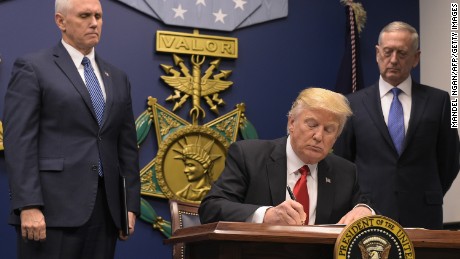When word of the nationwide enforcement raids by ICE began to break about a week ago, I wanted to be able to say that this is not the time to get hysterical. I wanted to say that these occasional raids are common, and certainly happened under the Obama Administration. But as I read more and more news accounts, I cannot say that. Instead, what I am seeing is a coordinated attack on the Latino community in a modern-day which hunt to find anyone ICE can seek to remove from the United States. I see the utter demise of any sense of humanity or dignity in this nation's immigration enforcement policy. I see the Constitution being torn to shreds.
Let's start with the change in policy itself. Under the Obama Administration, ICE was instructed to concentrate its enforcement resources on priority cases involving dangerous criminal aliens. Undocumented aliens who were here just earning money to feed their families, and who had not had brushes with the law, were given leniency.
In his first week in office, President Trump signed three executive orders on immigration policy. In one order, the President outlined the new enforcement priorities, which included aliens who had committed acts that constitute a crime but who have not been convicted. To some degree, this seemed innocuous enough. The Immigration and Nationality Act does have a similar basis of inadmissibility.
In a closed-door session with lawmakers, however, ICE leadership let it be known that it viewed Trump's executive order as removing the shackles imposed by the Obama Administration. Now the reference to aliens who had committed acts that constituted a crime but who had not been convicted was being interpreted to mean that any of the aliens present in the United States without valid legal status was considered a priority for enforcement. That is, instead of the two to three million Trump believed were criminal aliens he wanted to focus on, ICE considered all eleven million undocumented aliens as fair game for removal.
It should be noted that in this very meeting where ICE announced its interpretation of the Trump policy, certain Latino congressional representatives were turned away. That's right. Latino congressional representatives were denied the right to hear from ICE itself the new enforcement priorities that would affect their Latino constituents and their families.
What's worse is that ICE's enforcement activities have shown an utter disregard for morality and human decency, as ICE has practically declared war on the Latino community. Let's explore just a few examples.
In Arizona, a woman who had been reporting into ICE annually for ten years was taken into custody during her annual check-in. Within 48 hours she was removed because a decade before she used a phony Social Security number to find work. She had no history of any violent crimes.
In Washington State, a man who had been granted protection and work authorization pursuant to President Obama's Deferred Action for Childhood Arrivals program (DACA) was taken into custody during a raid on his home targeting his father. ICE ignored the DACA protection, claiming the man had known gang affiliations. ICE's evidence of this? A tattoo which translates into English as "peace."
In Virginia, ICE waited outside a church hypothermia shelter to stop Latino males as they left the shelter in the morning. One of the Latino males stopped was a permanent resident who is in this country legally. Obviously, ICE's marching orders were to stop all Latino males with the hope of finding one or two who would be removable.
But the piece de resistance? In Texas, ICE waited outside a courtroom as a woman obtained a protective order against her abusive partner. Once she left the courtroom, ICE arrested her. In all likelihood, the tip to ICE on where the woman would be was given by the abuser.
What conclusions, then, are the Latino community supposed to take from ICE's recent actions? First, ICE has no interest in being transparent and telling Latino political leaders what it's enforcement priorities are. Second, don't bother venturing out to seek any legal protection or to accept help from others with charitable intentions. Are you homeless and need shelter for the night? ICE will be waiting outside the door to take you into custody in the morning. Are you an abused woman? If you seek help in the courts, the moment you step outside of the courtroom, ICE will be there to perpetuate the abuse. Are you a Latino male? ICE will presume gang affiliation, especially if you have any tattoos.
The point is that ICE's indiscriminate attacks on the Latino community must be resisted. ICE knows that due to language barriers, many Latinos present here don't know their rights. ICE knows that many Latinos will not resistente the assertion of authority. This has to change.
Know your rights, and understand that ICE had to act within the constraints of the Constitution. Don't open the door to ICE unless they show you a judge-issued warrant. Don't answer any questions posed by ICE. Demand your right to see a lawyer. Don't sign any papers without consulting a lawyer first. Insist on a hearing. Only by fighting back within the bounds of the legal system can we push back against ICE's assault on the Latino community.
By: William J. Kovatch, Jr.
For an appointment call (703) 837-8832
(571) 551-6069 (español)



